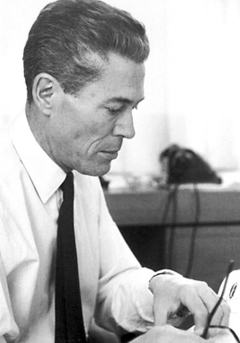On this date in 1910, French biologist and Nobel Prize winner Jacques Lucien Monod was born in Paris to an American mother (Charlotte MacGregor Todd from Milwaukee) and a French Huguenot father, Lucien Monod, who was a painter and inspired him artistically and intellectually. In his doctoral work at the Sorbonne, Monod coined the term diauxie, meaning two growth phases, to describe different growth patterns he observed in bacteria. Monod is most famous for discovering, along with Francois Jacob and Andre Lwoff, the Lac operon feedback mechanism in living cells.
Monod received the 1963 Legion d’honneur, the highest decoration in France, for the operon theory of genetic control. The 1965 Nobel Prize in Physiology or Medicine was awarded jointly to Monod, Jacob and Lwoff “for their discoveries concerning genetic control of enzyme and virus synthesis,” according to the Nobel Foundation website. Monod was among the first to suggest the existence of messenger RNA molecules. He’s considered one of the founders of molecular biology.
In addition to his scientific work, Monod was a talented musician and wrote on the philosophy of science. In his 1971 book, Chance and Necessity, he expounded on “an entirely non-providential view of the biological world as the mere product of chance and necessity, and proposed that the natural sciences reveal a purposeless world which entirely undercuts the tradition claims of religions.” (Cambridge University website, “Investigating Atheism.”)
In 1938 Monod married Odette Bruhl, an archaeologist and curator of the Guimet Museum in Paris. Their twin sons became a geologist and a physicist. He died of leukemia at age 66 and is buried in Cannes on the French Riviera. (D. 1976)


